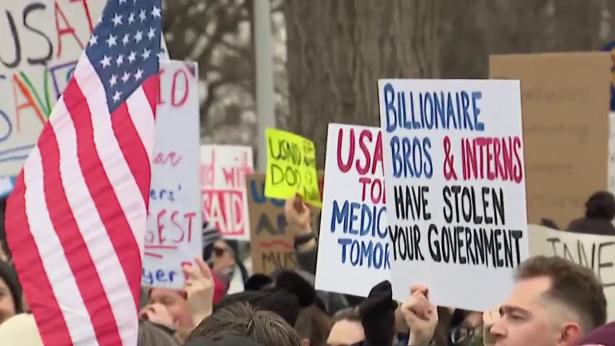A federal judge said on Monday that the Trump administration’s deferred resignation program would remain paused until he ruled on its legality, hours before a deadline for roughly two million federal workers to accept incentives to quit.
Federal officials had set a deadline of 11:59 p.m. Eastern time on Monday for employees to join the resignation program, known as “Fork in the Road,” part of an Elon Musk-led initiative to drastically slash the size of the federal government. Federal workers who take the offer would receive pay through September, according to the Trump administration.
George A. O’Toole Jr., a U.S. District Court judge in the District of Massachusetts, last week stopped the Office of Personnel Management, the federal government’s human resources agency, from moving ahead with the program until Monday’s hearing, forcing the government to adjust its deadline for employees to accept the offer.
It was not immediately clear when Judge O’Toole would rule.
“The program is NOT being blocked or canceled,” the agency said in a social media post last week. “The government will honor the deferred resignation offer.”
McLaurine Pinover, a spokeswoman for the Office of Personnel Management, said in a statement Monday that federal agencies could still process resignations, and had begun receiving lists of employees who chose to quit. More than 65,000 people had taken the offer, she said, adding that “the number continues to grow.”
The roughly 65,000 federal workers who accepted the deferred resignation offer represent less than 3 percent of all 2.3 million federal workers, excluding the military and the Postal Service. Mr. Musk, who is spearheading the Trump administration’s efforts to whittle down the federal government, had circulated an estimatethat the offer could lure 5 to 10 percent of the federal work force to leave.
Around 150,000 federal workers, or 7 percent, voluntarily leave the government every year.
The liberal nonprofit Democracy Forward and government unions representing hundreds of thousands of federal workers — the American Federation of Government Employees; the American Federation of State, County and Municipal Employees; and the National Association of Government Employees — had sued to stop the resignation program. They argued that it was unlawful in part because Congress had not yet appropriated funds to compensate workers the Trump administration was promising to pay.
Congress faces a mid-March deadline for a new spending deal, which could hold up any potential funds used to pay federal workers who resign.
Judge O’Toole last week instructed lawyers representing the Trump administration to contact employees who had received the offer and inform them that the program was paused. The original deadline of 11:59 p.m. last Thursday was pushed back.
Elena Goldstein, a lawyer for Democracy Forward, told Judge O’Toole on Monday that the Trump administration’s resignation program was arbitrary and devised to pressure federal workers without collective bargaining rights. The program, she argued, was a pretense for Mr. Musk to fire people and fill the ranks of government agencies with his associates.
“It was issued in blanket fashion without analysis of which positions were no longer needed or vital to government,” she said, adding that the federal government could continue to change the terms of its offer until the last minute. Personnel officials, she said, appeared to be “making this up as they go along.”
Eric Hamilton, a Trump administration lawyer, defended the program, saying that President Trump’s vows to reshape the federal government may come as a “disappointment” to agency employees, but that the resignation offer was a “humane off-ramp” that temporarily preserved salary and benefits.
The federal personnel office, Mr. Hamilton said, needed to move ahead with a broader reorganization once the deferred resignation program ended, and needed to know conclusively who wanted to participate.
“Holding it open would only inject more uncertainty,” he said.
Trump administration officials have argued that concerns about the legality of the plan were “misplaced,” and that separation agreements would be legally binding.
“Union leaders and politicians telling federal workers to reject this offer are doing them a serious disservice,” Ms. Pinover, the personnel office spokeswoman, said in a statement last week. “This is a rare, generous opportunity.”
The vague conditions of the offer, and its uncertain legality, had already caused widespread confusion in the federal work force. The Social Security Administration’s human resources office emailed employees a sample agreement, which featured a stipulation that a lapse in federal funds would not affect the deal. But the agreement also noted that the administration’s obligations “are subject to the availability of appropriations.”
Some federal workers, including those with probationary status who could be fired soon, may find the program attractive, leading them to weigh whether the deal would offer some financial security.
The hearing before Judge O’Toole on Monday was the latest turn in the Trump administration’s blitz of actions seeking to curtail and slash the federal work force. Over the weekend, employees at the Consumer Financial Protection Bureau were ordered to stay home and halt nearly all their work, including their supervision of banks, as Mr. Musk and a team of young aides hunted for large cuts.
Mr. Trump and Mr. Musk have faced a series of legal setbacks in recent days. On Monday, a federal judge said that the White House had defied his order to release billions of dollars in federal grants.
A federal judge in New York restricted access by Mr. Musk’s team to the Treasury Department’s payment and data systems. And a judge in New Hampshire issued an injunction on Monday blocking Mr. Trump’s executive order on birthright citizenship, the third federal judge to do so.
On Friday, just before U.S. Agency for International Development workers were set to have been suspended with pay or laid off, a court issued a temporary order that allowed employees already on administrative leave to be reinstated until the end of this Friday.
Madeleine Ngo contributed reporting.


Spread the word